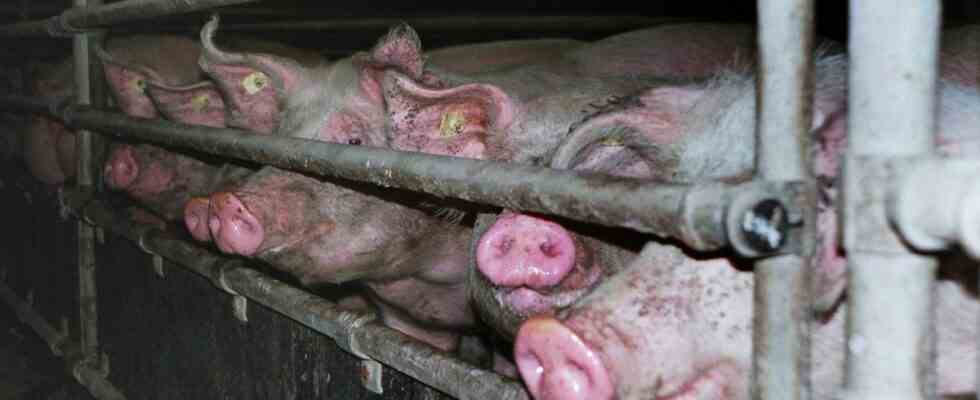When Green Week begins in Berlin on Friday, it won’t just be a demonstration of good food and life. 1400 exhibitors of the culinary giant show will not save with references to sustainability and animal welfare. No farmer’s wife and no professional association wants to be left alone with not paying attention to environmental protection or species-appropriate rearing when it comes to nutrition. Behind the scenes, however, there is fighting, especially over animal husbandry.
There will also be a debate about this in the Bundestag on Monday. The Agriculture Committee meets there, and it looks like there will be criticism of Federal Agriculture Minister Cem Özdemir. The Greens are planning a state seal for unprocessed pork that is intended to support farmers who give their animals more space than required.
Anyone who wants to buy a raw pork schnitzel in the store, for example, should be able to see from a sticker in the future whether the animals were fattened in a narrow stall or in a more species-appropriate manner. This labeling should not be voluntary, but mandatory, unlike previous seals.
Identifiable by sticker
“By introducing mandatory labelling, the end consumer can consciously choose forms of husbandry that differ from the legal minimum standard and offer the animals the opportunity to carry out species-specific behavior to a greater extent,” says Özdemir’s draft law. He causes Zoff, also because unpleasant animal husbandry should be immediately recognizable by a sticker.
The designation “Stable” is planned as the lowest level. Here livestock farmers only have to offer their pigs minimum legal standards. Level 2, i.e. a little more animal-friendly, is the “stall + space” type of housing, which requires 20 percent more space and some variety. Level 3, the “fresh air barn”, also allows the animals to feel the weather and collect “environmental impressions”. Stage 4 “outdoor/outdoor” requires an accessible outdoor area. The top level is the “organic” label – and one of many stumbling blocks.
Conventional pig farmers are very angry about the planned labeling requirement. The industry is under economic pressure because less and less pork is being eaten and exported in Germany. And when the associations are heard about Özdemir’s plans on Monday, the German Farmers’ Association will probably scold the loudest. “The restructuring of animal husbandry will not succeed in this way,” he says in his statement. The meat label leads to more bureaucracy and unequal treatment of domestic companies compared to foreign ones. Because creating more space or converting stables costs money. Such requirements do not apply in other countries.
“sham”
It is also criticized that the animal husbandry label should only apply to fattening pigs, i.e. to animals that already weigh around 30 kilos and are mostly bought from abroad as young animals in order to then fatten them up in Germany. But what, asks the German Farmers’ Association, if these animals were not kept in a species-appropriate manner abroad or were castrated without anesthesia before they were imported to Germany? Then their meat could still achieve a high level in Özdemir’s labeling with the appropriate stall size in Germany. The project is a sham and has an “immense credibility problem”.
The working group on rural agriculture, which was otherwise often seen alongside the Greens, is similarly critical. “Simply sorting animal husbandry into certain categories does not create any incentive for companies to convert their stables into more species-appropriate husbandry systems,” says the association’s statement. “Financial incentives” are needed. When labeling meat, sows and piglets should also be taken into account. Others criticize that the seal only applies to pigs, but not to cattle or poultry – or that animal transport is not taken into account. And why, farmers ask, is the minister urging conventional livestock farmers to make expensive investments, while organic farms automatically receive the best quality seal?
Cem Özdemir points out that his plans are only a first step – and that he has to have his labeling requirements approved in Brussels. If he were to extend it to other farm animals in all phases of life, the project would be doomed to failure. Özdemir was able to get one billion euros from the finance minister as start-up financing for the next few years. Pig farmers should get money for investing in stables, including additional costs for species-appropriate husbandry, such as straw. The amount is not enough in front and behind. So far, however, nothing more can be done with the FDP.
Özdemir’s party friend Renate Künast will have to weather the wrath of the industry in the agricultural committee. “Many of those involved act as if they were willing to change animal husbandry. But when the time comes, they fight against it,” said the former consumer protection minister of the SZ. Voluntary measures as in the past were not enough. “A mandatory indicator is the basis for future-proof conversion that not only serves niches,” says Künast. The labeling requirement would be followed by a change in the Animal Welfare Act and the requirements for animal transport in 2023. “I hope that we all really want an ambitious change,” said Künast. Fights are to be expected.

